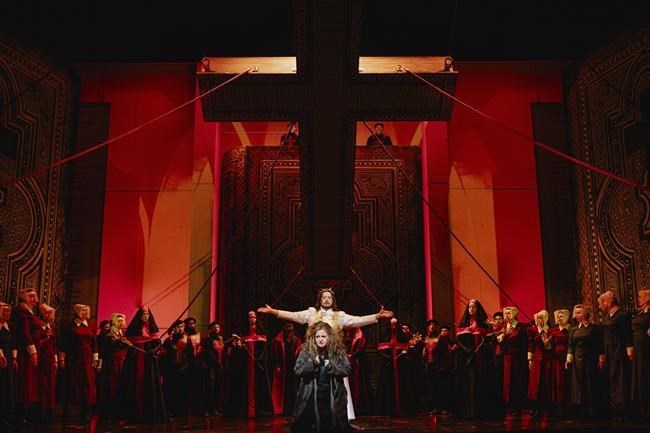
This image released by Bard College shows Jennifer Feinstein as Fidès, foreground center, and Robert Watson as Jean de Leyde, during a performance of "Le prophète," at Fisher Center at Bard College in Annandale-on-Hudson, N.Y. (Andy Henderson/Bard College via AP)
July 31, 2024 - 7:09 AM
ANNANDALE-ON-HUDSON, N.Y. (AP) — A demagogue and religious fanatics impose a theocracy. What sounds like a ripped-from-the-headlines 21st century story was portrayed by Giacomo Meyerbeer 175 years ago in "Le Prophète" and brought back in a compelling production by Bard's SummerScape festival.
A success at Paris' Salle Le Peletier in 1849, “Le Prophète" became a world-wide hit only to disappear as Meyerbeer's grand operas lost favor in the 20th and 21st centuries. Bard's staging, which opened Friday at the 900-seat Sosnoff Theater and runs through Sunday, is the first major U.S. production since the Metropolitan Opera's performances in 1977 and '79.
“There is no composer in the history of classical music and opera whose posthumous career has been so startlingly destroyed as Meyerbeer," said conductor Leon Botstein, the Bard College president who conducts the performances as American Symphony Orchestra music director. “What really hurt Meyerbeer's career is the seduction of the public by the illusion of realism: on the one hand mythological fantasy realism that Wagner perfected and ultimately later in the century, verismo, when the Italians made a kind of psychological drama out of ordinary life."
Even with cuts, the five-act performance runs 4 1/2 hours, including a pair of intermissions. Botstein, musicologist Mark Everist and director Christian Räth restored the 11-minute overture, cut by Meyerbeer and librettist Eugène Scribe during rehearsals. The third-act ballet “Les Patineurs (The Ice Skaters)” was dropped at Bard and excerpts of the music presented by a quintet in the lobby during intermissions.
“The piece unfortunately, feels very, very modern and rings a lot of bells for today,” Räth said. “Although it’s set sometime in the 16th century, the original story, it just translates to our recent history or to present seamlessly,”
“Le Prophète” was groundbreaking, debuting the year after the 1848 revolutions and including the first staged use of electric lights.
“In German-speaking lands in the early 1920s, Meyerbeer gets caught in a kind of double fork," Everist said. "On the one hand, Weimar Republic liberals viewed him a kind of royalist lackey — he was the general music director in the Prussian court, for example. On the other side, you got right wingers who are chastising him for being Jewish.”
“Le Prophète" tells the story of John of Leiden (Jean), who became an Anabaptist prophet, led the 1534 takeover of the German city Münster, proclaimed it “New Jerusalem” and declared himself king. The city was retaken by prince-bishop Franz von Waldeck a year later and John was executed in 1536.
In the invented opera's love story, Berthe (soprano Amina Edris) meets Fidès (mezzo-soprano Jennifer Feinstein), Jean's mother, and Berthe wants to marry Jean (tenor Robert Watson). Her request is refused by Oberthal (bass-baritone Zachary Altman), the count in control of the Dutch city Dordrecht, who wants Berthe for himself.
Three Anabaptists think Jean resembles a portrait of King David in Münster's cathedral, and he becomes king in grand coronation scene, the opera's most-known music. Fidès thinks Jean is dead, then when she finds him alive exposes him as a false prophet. Fidès recants, Berthe stabs herself to death and Jean sets fire to the castle, killing all.
Räth, who designed the set with Daniel Unger, put the action in and around three 20-foot-high Bibles of faux leather. Mattie Ullrich's costumes ranged from historical to contemporary, highlighting the relevancy.
At the exact time Feinstein was on stage at Bard on Sunday, her husband, bass-baritone Nicholas Brownlee, was making his Bayreuth debut as Donner in “Das Rheingold.” Feinstein studied under Marilyn Horne, who sang the role at the Met.
“I’m certainly not trying to imitate her. No one can be Marilyn Horne.” Feinstein said. “She’s the absolute idol for a voice type like me. But I definitely look up to her so much. And ever since I went to Music Academy of the West, I was told this role is perfect for me."
Singers worked with the creative team for months mixing and matching the two editions of the score, the original and the Brandus version.
“It's about a cult of personality. Everyone's manipulating everyone else,” Watson said. “It’s this kind of repeating motif of history, of the dangers of following these flawed individuals and what motivates that sort of person.”
Botstein launched SummerScape in the Frank Gehry-designed theater in 2003 with the first U.S. staged production of Janácek's “Osud” and has proven himself a superior talent scout. The 2009 SummerScape performances of Meyerbeer's “Les Huguenots” featured Erin Morley and Michael Spyres, who have gone on to major careers.
Botstein will soon turn attention to next year's opera, an ever rarer work in Smetana's "Dalibor." He says part of SummerScape's mission is “to protect and revise the history of music from unjust obscurity.”
News from © The Associated Press, 2024